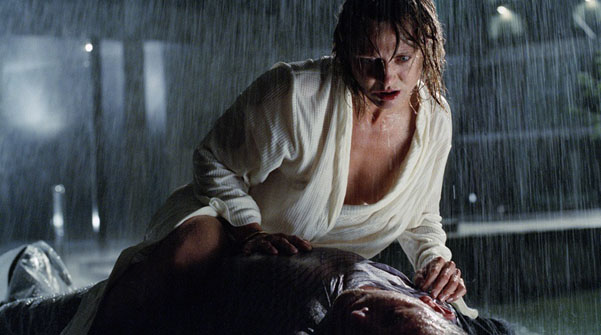Just Another Love Story
This film’s deceptively dismissive title is a mischievous nod to the fact that Just Another Love Story is anything but.
Plot summary
Life in the suburbs as a father of two has worn down Jonas. When a victim of a car crash mistakes him for her boyfriend Sebastian, things take a very dramatic turn as the line between truth and deception is erased.

This film’s deceptively dismissive title is a mischievous nod to the fact that Just Another Love Story is anything but. While it does indeed display some of the idiosyncrasies of the romance genre, this flick nestles far more comfortably alongside those films which are traditionally described as thrillers or horrors.
The film opens with three short bursts of action to whet our appetite; each is entitled ‘Love Scene’. In one of the shorts, a gun shot pierces the air, and evidence of another violent crime scene provides a tantalising taste of what is to come.
Written and directed by Ole Bornedal, Just Another Love Story is filmed in Danish with English subtitles. To describe it as simply a thriller would be a crude oversimplification. The blackly comic film draws inspiration from aspects of film noir and expertly weaves the Greek myth of Orpheus and Eurydice into the plotline. It always makes a refreshing change to view a foreign, quirky art-house flick in a mainstream cinema; a welcome break from big-budget, big-bore Hollywood blockbusters.
An initially unsettling and bewildering story quickly becomes terrifyingly thrilling. A horrific car crash screams onto the screen, hinting at the horror that will ensue, and signalling the beginning of the end for protagonist Jonas’ cosy, comfortable existence at the heart of middle-class mundanity. Faithful to the cliché, the collision is the catalyst which will change Jonas’ life in a split second.
Jonas’ curiosity is aroused by Julia, the enigmatic victim of the car crash. Bewitched by the dark headed Dane and in a case of ultimately fatal mistaken identity, Jonas is forced to adopt a persona, succeeding to convince the shocked (and conveniently blind and amnesic) victim that her boyfriend is by her side. The fabric of Jonas’ old life begins to disintegrate as he crafts an intricate tale and gets lost in his own invention. Jonas fails to resist Julia’s enticing promise of a life free from tedium, habit and humdrum. Be careful what you wish for.
The linear narrative is frequently broken up and our pulses quickened with the interspersal throughout the film of disturbing flashbacks and the silent, macabre apparition of an ethereal figure who materialises in shadowy corridors and lurks around dark corners, bandages masking his face. Hints of a sinister storyline abound.
Brief shots of a young couple frolicking on a foreign beach flicker onto the screen. The scenes are flooded with light, providing a sharp contrast to the muted tones of Jonas’ suburban habitat; yet the sight of blood as the young couple kiss and the hint of violence in this idyllic setting are chillingly incongruous. Trouble in paradise.
An eerie scene on a desolate Danish beach towards the film’s vicious end cruelly imitates the tropical setting of the flashbacks.
Occasionally farcical, dramatic momentum is nonetheless skilfully maintained throughout this film, as the director neatly ties up the frayed ends of the slightly convoluted plot. The film confounds, shocks, amuses and never fails to thrill, as the audience is swept along on this gruesomely gripping and darkly comic tale.
So long as you can suspend disbelief and stomach the gore, this sinister slice of Scandinavian cinema is well worth a watch.











COMMENTS